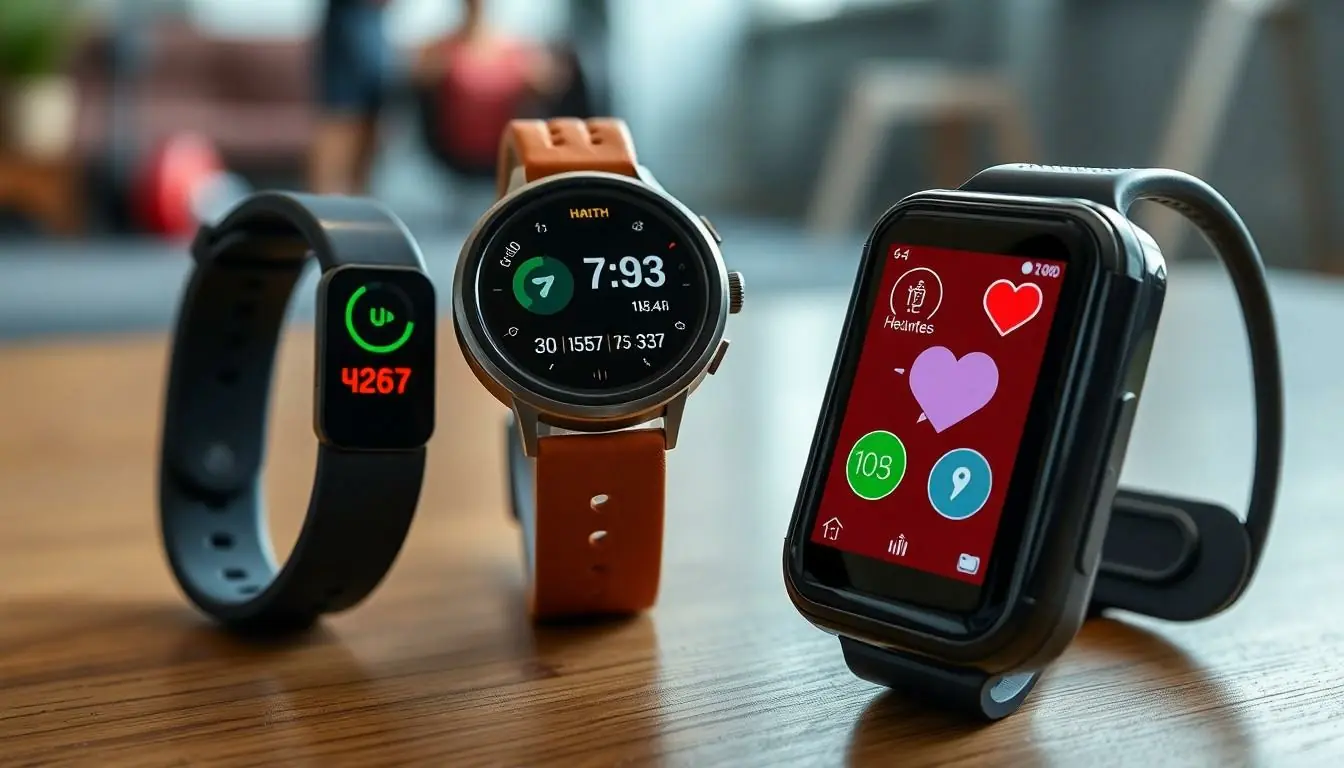Table of Contents
ToggleIn a world where your wrist can track your heart rate, count your steps, and even remind you to breathe, biometric wearables are the superheroes of health tech. Gone are the days when fitness meant just sweating it out at the gym; now, it’s about having a tiny gadget that whispers sweet nothings about your body’s performance. Who wouldn’t want a personal trainer that fits snugly on their wrist?
These devices don’t just look cool; they’re packed with features that turn everyday health monitoring into a fun game. From tracking sleep patterns to measuring stress levels, biometric wearables are like having a sidekick that cheers you on while keeping you in check. So if you’re ready to level up your wellness game and impress your friends with your tech-savvy lifestyle, it’s time to dive into the world of biometric wearables.
Overview of Biometric Wearables
Biometric wearables refer to devices equipped with sensors that collect personal health data. These gadgets track various metrics, including heart rate, blood oxygen levels, sleep patterns, and physical activity. The integration of advanced technologies, such as artificial intelligence, enhances data accuracy and user experience.
Wearables serve as personal health companions, making health monitoring accessible and user-friendly. They promote active lifestyles by encouraging users to meet daily activity goals through notifications. Many wearables also feature GPS for tracking outdoor exercises like running or cycling, offering more comprehensive fitness insights.
Smartwatches, fitness bands, and health monitoring rings are common types of biometric wearables. Smartwatches often combine fitness tracking with additional features, such as notifications for calls and messages. Fitness bands typically focus on tracking health metrics, making them lightweight and comfortable for daily wear. Health monitoring rings provide an unobtrusive way to measure vital statistics discreetly.
Certain biometric wearables offer integration with mobile apps for personalized health guidance. Mobile apps enhance user engagement by providing tailored health insights, setting fitness goals, and tracking progress. This technology helps users understand their health better and maintain motivation through gamified experiences.
The rise of biometric wearables reflects a growing trend towards preventive healthcare. Users gain valuable health insights that encourage proactive behavior. Enhanced data collection leads to improved health outcomes, making these devices essential in modern health management.
Types of Biometric Wearables

Biometric wearables come in various forms, each tailored to specific health and fitness needs. Understanding these types helps users choose the right device.
Fitness Trackers
Fitness trackers monitor physical activities like steps taken, calories burned, and heart rate. Many include features such as sleep tracking and reminders for movement. Wearers benefit from real-time feedback, promoting active lifestyles. Popular fitness tracker brands include Fitbit and Garmin, renowned for their accuracy and design. Users find these devices ideal for setting fitness goals and tracking progress over time.
Smartwatches
Smartwatches integrate traditional watch features with advanced health monitoring capabilities. Users receive notifications for calls, messages, and apps directly on their wrist. Many smartwatches offer comprehensive health metrics, including ECG readings and blood oxygen saturation levels. Brands such as Apple and Samsung lead the market, providing sleek designs and robust functionality. They serve as personal health assistants, making it easy for individuals to manage daily health tasks.
Medical Devices
Medical devices serve specific health monitoring purposes, catering to users with chronic conditions. These gadgets track vital signs, such as blood sugar levels and heart conditions. Compliance with medical regulations ensures the accuracy of the data collected. Examples include continuous glucose monitors and ECG devices, which provide valuable insights for users. Patients find these wearables essential for managing their health proactively.
Key Features and Technologies
Biometric wearables provide advanced functionalities that enhance personal health tracking. They incorporate cutting-edge technology to deliver accurate insights and improve user engagement.
Sensors Used in Biometric Wearables
Heart rate monitors, accelerometers, and gyroscopes make up the primary sensors found in biometric wearables. These sensors measure vital signs and track physical movements, ensuring comprehensive health monitoring. SpO2 sensors measure blood oxygen levels, while skin temperature sensors monitor changes in body temperature. Additionally, some devices include electrocardiogram sensors for detecting irregular heart rhythms. Each sensor contributes to a complete picture of an individual’s health, allowing users to make informed decisions.
Data Collection and Analysis
Data collection occurs through continuous monitoring of physiological metrics. Wearables gather information such as steps taken, calories burned, sleep quality, and heart rates. Advanced algorithms analyze this data to provide actionable insights, enabling users to grasp their health trends effectively. Cloud-based storage facilitates easy access to historical data, while artificial intelligence enhances prediction accuracy for future health events. Notifications and personalized reports motivate users to maintain or improve their wellness journeys, reinforcing proactive health management.
Benefits of Biometric Wearables
Biometric wearables provide significant advantages for users, especially regarding health and lifestyle. Their capabilities enhance overall well-being through various functionalities.
Health Monitoring
Health monitoring is one of the primary benefits of biometric wearables. These devices track vital signs such as heart rate, blood oxygen levels, and sleep patterns. Real-time data collection allows users to monitor their health continuously, facilitating timely interventions if necessary. Comprehensive reports generated by these wearables create a clearer picture of an individual’s health status. This continuous feedback empowers users to make informed decisions regarding their fitness routines. Integration with mobile apps enhances the experience, providing users personalized insights based on collected data.
Lifestyle Improvement
Lifestyle improvement is another vital aspect of biometric wearables. These devices motivate users to adopt healthier habits through goal-setting and reminders. Notifications encourage regular physical activity, while sleep monitoring promotes better rest hygiene. Users can also enjoy gamified challenges that make fitness routines engaging and enjoyable. Personalized recommendations based on activity levels help individuals tailor their wellness journey. Increased awareness of daily habits fosters a proactive approach to health, enabling users to pursue more balanced lifestyles. In turn, this shift leads to long-term health benefits and improved quality of life.
Challenges and Limitations
Biometric wearables face numerous challenges and limitations that impact their effectiveness and user acceptance.
Privacy Concerns
Privacy concerns rank high among the issues surrounding biometric wearables. Users worry about how their health data is collected, stored, and used. Data breaches can expose sensitive information, leading to identity theft or unauthorized access to personal health details. Companies often collect vast amounts of data, raising questions about consent and data ownership. Striking a balance between data utilization and user privacy remains crucial. As regulatory frameworks evolve, the industry must ensure compliance to protect user information while enhancing trust.
Accuracy of Data
Accuracy of data poses another significant challenge for biometric wearables. Factors like skin type, placement of the device, and environmental conditions can affect measurement reliability. Errors in heart rate or sleep data can mislead users, resulting in poor health decisions. Moreover, some devices lack clinical validation, which raises skepticism among healthcare practitioners. Users need to understand these limitations to interpret data appropriately. Continuous advancements in technology and sensor development aim to enhance accuracy, yet discrepancies still exist.
Biometric wearables are revolutionizing personal health management by making fitness tracking accessible and engaging. These devices empower users to take charge of their health through real-time data and personalized insights. As technology continues to advance the accuracy and functionality of these wearables, they’ll likely play an even more significant role in preventive healthcare.
While challenges like privacy concerns and data accuracy remain, the benefits of biometric wearables far outweigh the drawbacks. They encourage healthier lifestyles and provide motivation through gamified experiences. By embracing these innovative tools, individuals can enhance their well-being and enjoy the journey towards a healthier life.




